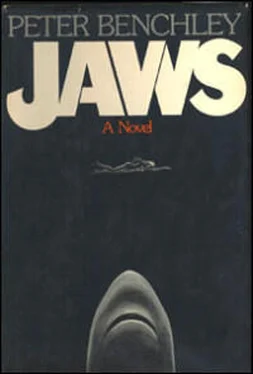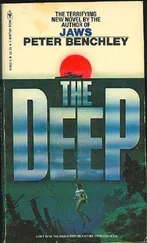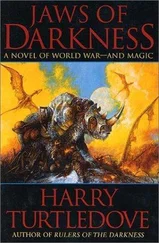Peter Benchley - Jaws
Здесь есть возможность читать онлайн «Peter Benchley - Jaws» весь текст электронной книги совершенно бесплатно (целиком полную версию без сокращений). В некоторых случаях можно слушать аудио, скачать через торрент в формате fb2 и присутствует краткое содержание. Город: New York, Год выпуска: 1973, Издательство: Doubleday, Жанр: Триллер, на английском языке. Описание произведения, (предисловие) а так же отзывы посетителей доступны на портале библиотеки ЛибКат.
- Название:Jaws
- Автор:
- Издательство:Doubleday
- Жанр:
- Год:1973
- Город:New York
- ISBN:нет данных
- Рейтинг книги:5 / 5. Голосов: 2
-
Избранное:Добавить в избранное
- Отзывы:
-
Ваша оценка:
- 100
- 1
- 2
- 3
- 4
- 5
Jaws: краткое содержание, описание и аннотация
Предлагаем к чтению аннотацию, описание, краткое содержание или предисловие (зависит от того, что написал сам автор книги «Jaws»). Если вы не нашли необходимую информацию о книге — напишите в комментариях, мы постараемся отыскать её.
Jaws — читать онлайн бесплатно полную книгу (весь текст) целиком
Ниже представлен текст книги, разбитый по страницам. Система сохранения места последней прочитанной страницы, позволяет с удобством читать онлайн бесплатно книгу «Jaws», без необходимости каждый раз заново искать на чём Вы остановились. Поставьте закладку, и сможете в любой момент перейти на страницу, на которой закончили чтение.
Интервал:
Закладка:
Fifty yards farther out, the ocean floor dropped precipitously — not with the sheerness of a canyon wall, but from a slope of perhaps ten degrees to more than forty-five degrees. The water was fifteen feet deep where the slope began to change. Soon it was twenty-five, then forty, then fifty feet deep. It leveled off at a hundred feet for about half a mile, then rose in a shoal that neared the surface a mile from shore. Seaward of the shoal, the floor dropped quickly to two hundred feet and then, still farther out, the true ocean depths began.
In thirty-five feet of water, the great fish swam slowly, its tail waving just enough to maintain motion. It saw nothing, for the water was murky with motes of vegetation. The fish had been moving parallel to the shore-line. Now it turned, banking slightly, and followed the bottom gradually upward. The fish perceived more light in the water, but still it saw nothing.
The boy was resting, his arms dangling down, his feet and ankles dipping in and out of the water with each small swell. His head was turned toward shore, and he noticed that he had been carried out beyond what his mother would consider safe. He could see her lying on her towel, and the man and child playing in the wave-wash. He was not afraid, for the water was calm and he wasn’t really very far from shore — only forty yards or so. But he wanted to get closer; otherwise his mother might sit up, spy him, and order him out of the water. He eased himself back a little bit so he could use his feet to help propel himself. He began to kick and paddle toward shore. His arms displaced water almost silently, but his kicking feet made erratic splashes and left swirls of bubbles in his wake.
The fish did not hear the sound, but rather registered the sharp and jerky impulses emitted by the kicks.
They were signals, faint but true; and the fish locked on them, homing. It rose, slowly at first, then gaining speed as the signals grew stronger.
The boy stopped for a moment to rest. The signals ceased. The fish slowed, turning its head from side to side, trying to recover them. The boy lay perfectly still, and the fish passed beneath him, skimming the sandy bottom. Again it turned.
The boy resumed paddling. He kicked only every third or fourth stroke; kicking was more exertion than steady paddling. But the occasional kicks sent new signals to the fish. This time it needed to lock on them only an instant, for it was almost directly below the boy. The fish rose. Nearly vertical, it now saw the commotion on the surface. There was no conviction that what thrashed above was food, but food was not a concept of significance. The fish was impelled to attack: if what it swallowed was digestible, that was food; if not, it would later be regurgitated. The mouth opened, and with a final sweep of the sickle tail the fish struck.
The boy’s last — only — thought was that he had been punched in the stomach. The breath was driven from him in a sudden rush. He had no time to cry out, nor, had he had the time, would he have known what to cry, for he could not see the fish. The fish’s head drove the raft out of the water. The jaws smashed together, engulfing head, arms, shoulders, trunk, pelvis, and most of the raft. Nearly half the fish had come clear of the water, and it slid forward and down in a belly-flopping motion, grinding the mass of flesh and bone and rubber. The boy’s legs were severed at the hips, and they sank, spinning slowly, to the bottom.
On the beach the man with the child shouted, “Hey!” He was not sure what he had seen. He had been looking toward the sea, then started to turn his head when an uproar caught his eye. He jerked his head back seaward again, but by then there was nothing to see but the waves made by the splash, spreading outward in a circle. “Did you see that?” he cried. “Did you see that?”
“What, Daddy, what?” His child stared up at him, excited.
“Out there! A shark or a whale or something! Something huge!”
The boy’s mother, half asleep on her towel, opened her eyes and squinted at the man. She saw him point toward the water and heard him say something to the child, who ran up the beach and stood by a pile of clothing. The man began to run toward the boy’s mother, and she sat up. She didn’t understand what he was saying, but he was pointing at the water, so she shaded her eyes and looked out at sea. At first, the fact that she saw nothing didn’t strike her as odd. Then she remembered, and the said, “Alex.”
Brody was having lunch: baked chicken, mashed potatoes, and peas. “Mashed potatoes,” he said as Ellen served him. “What are you trying to do to me?”
“I don’t want you to waste away. Besides, you look good chunky.”
The phone rang. Ellen said, “I’ll get it,” but Brody stood up. That was the way it usually happened. She would say, “I’ll get it,” but he was the one who got it. It was the same when she had forgotten something in the kitchen. She would say, “I forgot the napkins, I’ll get them.” But they both knew he would get up and fetch the napkins.
“No, that’s okay,” he said. “It’s probably for me anyway.” He knew the call was probably for her, but the words came reflexively.
“Bixby, Chief,” said the voice from the station house.
“What is it, Bixby?”
“I think you’d better come down here.”
“Why’s that?”
“Well, it’s like this, Chief…” Bixby obviously didn’t want to go into details. Brody heard him say something to someone else, then return to the phone. “I’ve got this hysterical woman on my hands, Chief.”
“What’s she hysterical about?”
“Her kid. Out by the beach.”
A twinge of unease shot through Brody’s stomach. “What happened?”
“It’s…” Bixby faltered, then said quickly. “Thursday.”
“Listen, asshole…” Brody stopped, for now he understood. “I’ll be right there.” He hung up the phone.
He felt flushed, almost feverish. Fear and guilt and fury blended in a thrust of gut-wrenching pain. He felt at once betrayed and betrayer, deceived and deceiver. He was a criminal forced into crime, an unwilling whore. He had to take the blame, but it was not rightly his. It belonged to Larry Vaughan and his partners, whoever they might be. He had wanted to do the right thing; they had forced him not to. But who were they to force him? If he couldn’t stand up to Vaughan, what kind of cop was he? He should have closed the beaches.
Suppose he had. The fish would have gone down the beach — say, to East Hampton — and killed someone there. But that wasn’t how it had worked. The beaches had stayed open, and a child had been killed because of it. It was as simple as that. Cause and effect. Brody suddenly loathed himself. And just as suddenly, he felt great pity for himself.
“What is it?” asked Ellen.
“A kid just got killed.”
“How?”
“By a goddamn sonofabitch of a shark.”
“Oh no! If you had closed the beaches…” She stopped, embarrassed.
“Yeah, I know.”
Harry Meadows was waiting in the parking lot at the rear of the station house when Brody drove up. He opened the passenger-side door of Brody’s car and eased his bulk down onto the seat. “So much for the odds,” he said.
“Yeah. Who’s in there, Harry?”
“A man from the Times , two from Newsday , and one of my people. And the woman. And the man who says he saw it happen.”
“How did the Times get hold of it?”
“Bad luck. He was on the beach. So was one of the Newsday guys. They’re both staying with people, for the weekend. They were onto it within two minutes.”
“What time did it happen?”
Meadows looked at his watch. “Fifteen, twenty minutes ago. No more.”
Читать дальшеИнтервал:
Закладка:
Похожие книги на «Jaws»
Представляем Вашему вниманию похожие книги на «Jaws» списком для выбора. Мы отобрали схожую по названию и смыслу литературу в надежде предоставить читателям больше вариантов отыскать новые, интересные, ещё непрочитанные произведения.
Обсуждение, отзывы о книге «Jaws» и просто собственные мнения читателей. Оставьте ваши комментарии, напишите, что Вы думаете о произведении, его смысле или главных героях. Укажите что конкретно понравилось, а что нет, и почему Вы так считаете.












